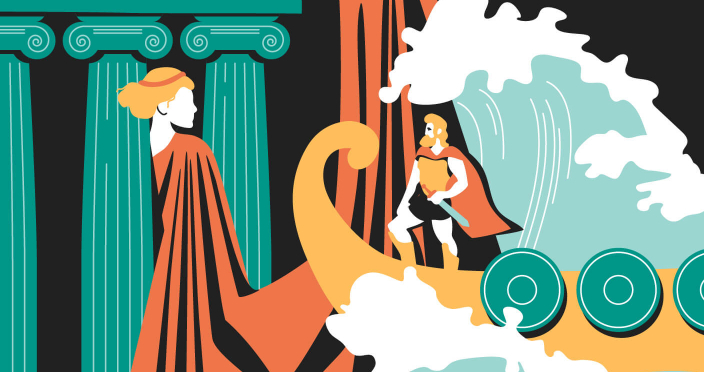The Odyssey characters are diverse and multifaceted, ranging from simple people and magnificent heroes to helpful gods and vile monsters. Part of their appeal lies in their complexity—no one is without flaws, and this is particularly true for The Odyssey‘s main character, Odysseus. His traits have duality: according to Yining Zhou’s 2024 article in LNEP, he is both an ordinary man and a hero, which makes him unconventional and reflects Homer’s profound understanding of human nature.
On this page, we will discuss characters in The Odyssey, including main characters, gods, and monsters. We’ve also created a detailed The Odyssey character map that visually represents their relationships.
📜 The Odyssey Character Map
There are numerous characters in The Odyssey, yet not everyone is as memorable or vital for the plot. In this character map, we have shown the relationships and dynamics that can be useful for you.
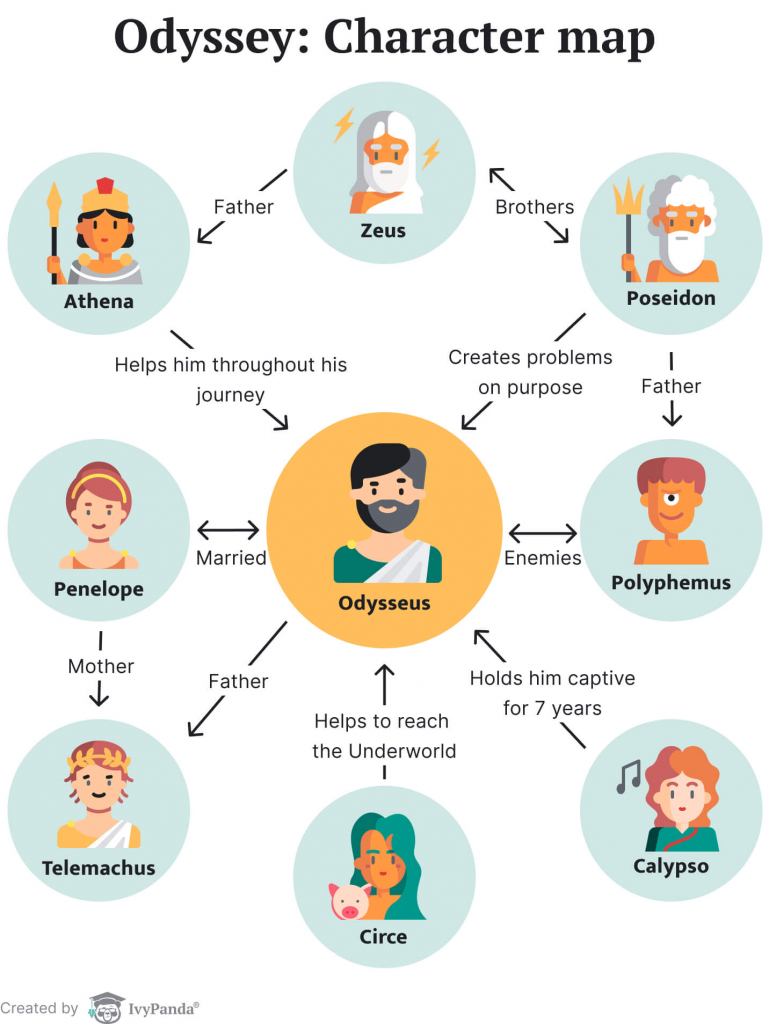
🗡️ The Odyssey Main Characters
Odysseus
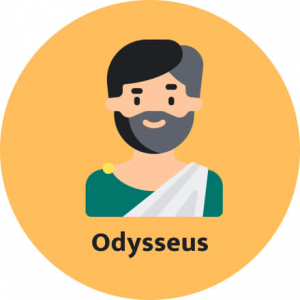
Who is Odysseus?
The king of Ithaca, the great hero of the Trojan War – this is how we are introduced to him. He is mentioned from the start of the story, even though he only physically appears in Book V. He has every trait characteristic of a great leader. Odysseus is strong, courageous, noble, and handsome. Most importantly, though, he is cunning. Odysseus’ character traits are abundant, but intellect is what keeps him out of trouble.
Our first meeting with the fabled hero is when he stands at the shores of Calypso’s island, weeping for home. Not even a promise of immortality can prevent his yearning. Odysseus’ desire to go back to Ithaca, to his family, is his driving force. Even after twenty years after the end of the Trojan War, he is still determined to return.
Is Odysseus a hero?
Undeniably – but that doesn’t mean that he is without flaw. As was mentioned before, nothing can stop him on his journey to return home. And he is ruthless to those who get in his way.
Odysseus blinds the Cyclops Polyphemus, outsmarting him and making sure he and his men get away safely. However, he lets his ego get the better of him. He reveals his name to the son of Poseidon, incurring the sea god’s wrath for the remainder of his journey. His hubris very nearly becomes his downfall.
What truly makes Odysseus a compelling character is the changes he goes through in the course of the poem. In the beginning, he is quick to indulge in the search for glory, ransacking villages and taunting his enemies. By the end of the story, Odysseus has learned his lesson. He is patient, careful, observant. He does not reveal himself to the suitors despite all the abuse they put him through. And it all pays off in the end when he finally reveals himself to his enemies, and Odysseus and Telemachus proceed to kill every last one of them.
💬 Odysseus’ Quotes
Now, how on earth could I forget Odysseus?
The Odyssey, Zeus, Book I
Great Odysseus who excels all men in wisdom,
Nevertheless I long—I pine, all my days—
The Odyssey, Odysseus, Book V
to travel home and see the dawn of my return.
And if a god will wreck me yet again on the wine-dark sea,
I can bear that too, with a spirit tempered to endure.
If any man on the face of the earth should ask you
The Odyssey, Odysseus, Book IX
who blinded you, shamed you so—say Odysseus,
raider of cities, he gouged out your eye,
Laertes’ son who makes his home in Ithaca!
You dogs! you never imagined I’d return from Troy—
The Odyssey, Odysseus, Book XXII
so cocksure that you bled my house to death,
ravished my serving-women—wooed my wife
behind my back while I was still alive!
Penelope
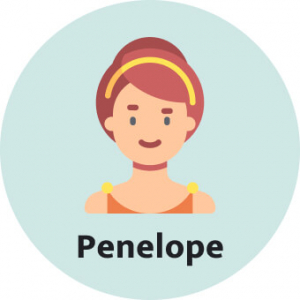
The most important character in the entirety of the epic is Odysseus’ wife. Penelope is the source of the conflict and the reason for the hero’s plight. She is the heart at the center of the story. Besides, Penelope is the queen of Ithaca, compared in beauty to goddesses.
It is no wonder that all those suitors took up a place in her home. Hoping that she would marry one of them, they invaded her home and refused to leave. Despite all of their rudeness, Penelope is unable to make them go away. After all, hospitality was a vital aspect of Ancient Greek culture – and the queen is the perfect hostess.
However, just like her husband, Penelope is also clever and cunning. She promises the suitors her decision about remarrying. Yet first, she has to finish a burial shroud for Laertes, Odysseus’ father. Penelope spends her days weaving and her nights undoing the day’s work.
When Odysseus visits the Underworld, the dead king Agamemnon advises him not to trust women. Not surprising: he was killed by his unfaithful wife and her lover. Thus, he fears Penelope must be plotting the same. But the queen of Ithaca remains loyal to her husband, her belief in him unyielding. Even as all around her assert that he is dead, she is relentless. Her love and grief for him never fade, even in twenty long years.
Penelope in The Odyssey is calm, calculating, reserved. Even after the slaughter of the suitors and the reveal of Odysseus, she remains cold. After all, it was so long that it became hard to believe her husband did return. So, being the intelligent woman that she is, Penelope organizes one final test for him. She mentions that their bed was moved in his absence. The hero immediately recognizes that this is an impossible feat, considering it is immovable – just like their love for each other. Odysseus and Penelope spend the rest of the night talking, telling each other stories of the missing twenty years.
💬 Penelope’s Quotes
Now down from her chamber came discreet Penelope,
The Odyssey, Narrator, Book XVII
looking for all the world like Artemis or golden Aphrodite—
So by day she’d weave at her great and growing web—
The Odyssey, Amphimedon, Book XXIV
by night, by the light of torches set beside her,
she would unravel all she’d done. Three whole years
she deceived us blind, seduced us with this scheme…
“Surely,” the foreman of men responded, “she’s still waiting
The Odyssey, Eumaeus, Book XVI
there in your halls, poor woman, suffering so,
her life an endless hardship …
wasting away the nights, weeping away the days.”
Woman—your words, they cut me to the core!
The Odyssey, Odysseus, Book XXIII
Who could move my bed? Impossible task,
even for some skilled craftsman—unless a god
came down in person, quick to lend a hand,
Telemachus
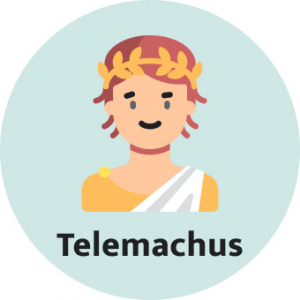
Odysseus’ son was only an infant when his father left for the Trojan War. Despite that, he remains loyal to his father and devoted to his mother. Telemachus hates the suitors that have taken residence in his household. Yet, he cannot make them leave. He is too polite and courteous to refuse them. And he is still too fearful.
It all changes when Athena recognizes his good heart and begins guiding him. She tells him to leave behind his childhood and to start thinking of the future. Telemachus gains the confidence to confront the suitors and sets out on the journey to find his father. He travels to distant lands to learn of Odysseus’ fate. Putting his trust in the gods, Telemachus marches forward.
By the end of the story, Telemachus develops into a fine warrior. He does not hesitate to help his father kill off the suitors. He is also ruthless when it comes to the betrayal of his mother’s maids.
However, he is still young. It shows when he accidentally allows the suitors to arm themselves, forgetting to lock the door behind him. Telemachus in The Odyssey may be as tall and handsome as his father, but he still has a long way to become Ithaca’s new king.
💬 Telemachus’ Quotes
He could almost see his magnificent father, here …
The Odyssey, Narrator, Book I
in the mind’s eye—if only he might drop from the clouds
and drive these suitors all in a rout throughout the halls
and regain his pride of place and rule his own domains!
You must not cling to your boyhood any longer—
The Odyssey, Athena, Book I
it’s time you were a man.
No clean death for the likes of them, by god!
The Odyssey, Telemachus, Book XXII
Not from me—they showered abuse on my head,
my mother’s too!
“My fault, father,” the cool clear prince replied,
The Odyssey, Telemachus, Book XXII
“the blame’s all mine. That snug door to the vault,
I left it ajar—they’ve kept a better watch than I.”
Laertes
Laertes is Odysseus’ father and Telemachus’ grandfather. Once upon a time, this man used to be a fabled Argonaut and the great king of Ithaca. However, Laertes in The Odyssey is but a tired and broken older man. He is living out his last days on a farm on the outskirts of the city.
He was heartbroken to see his son leave for Troy and knew that he wouldn’t return soon. In fact, in Odysseus’ absence, his mother and Laertes’ wife Anticlea died of a broken heart. It is she who warns her son that his father may soon suffer the same fate. Eumaios, the swineherd, reiterates this by saying that all he does these days is sit around and mourn.
We only meet with Laertes at the very end of the story, when Odysseus finally comes to visit. The older man is overjoyed at the sight of his son and grandson. Laertes finally seems to regain his lost spirit.
Argos
It is true what they say – a dog really is a man’s best friend. Argos waited for twenty long years for the return of his owner. Once quick and strong, he was left neglected by everyone in his old age.
Odysseus finds him lying on a pile of manure, tired and lonely. However, that doesn’t stop the dog from immediately recognizing its owner. Argos immediately sees through Odysseus’ disguise, having enough strength to wag his tail at him as he passes. And with that, having finally seen his owner once again, the loyal companion dies happy.
🔱 Gods in The Odyssey
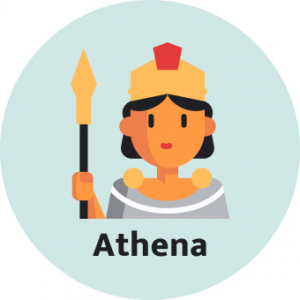
The goddess of warfare and heroism, Athena, is at the very center of events in The Odyssey. She plays a key part in guiding the characters through their journey. In Greek mythology, Athena is the favorite daughter of Zeus and is extremely powerful and shrewd. She has sway over most other gods and can convince them to do her bidding. However, Poseidon held a grudge against her, and Athena was apprehensive towards him, for she knows how powerful he is.
This is why it didn’t help her cause when her favorite mortal, Odysseus, incurred his wrath. In Athena’s eyes, the king of Ithaca embodies everything a true hero should. Not to mention, Odysseus is fiercely devoted to her. This is why she does everything in her power to bring him back home.
How does Athena help Odysseus?
She is careful and calculating. Using multiple disguises, she shifts the events to her liking. Athena is the one to suggest Telemachus go look for his father. She makes sure that Penelope knows her husband is alive. She is behind Odysseus’ escape from Calypso. Athena pulls all the strings behind the scenes and quietly makes sure everything goes according to her plan.
As was mentioned, she is the goddess of war – and also of justice. Athena, in The Odyssey, makes sure that her favorite hero gets his revenge – not a single suitor escapes punishment. Even the one Odysseus wanted to spare.
That being said, she is not after senseless bloodshed. At the end of the poem, when the townspeople are about to attack Odysseus and his followers, she intervenes. The goddess demands the fighting stop. And so, with Athena and Odysseus, peace is brought back to Ithaca.
💬 Athena’s Quotes
But I could not bring myself to fight my Father’s brother,
The Odyssey, Athena, Book XIII
Poseidon, quaking with anger at you, still enraged
because you blinded the Cyclops, his dear son.
Here among mortal men
The Odyssey, Athena, Book XIII
you’re far the best at tactics, spinning yarns,
and I am famous among the gods for wisdom,
cunning wiles, too.
Athena came to his prayer from close at hand,
The Odyssey, Narrator, Athena, Book II
for all the world with Mentor’s build and voice,
and she urged him on with winging words: “Telemachus,
you’ll lack neither courage nor sense from this day on,”
“Hold back, you men of Ithaca, back from brutal war!
The Odyssey, Athena, Narrator, Book XXIV
Break off—shed no more blood—make peace at once!”
So Athena commanded. Terror blanched their faces,
they went limp with fear, weapons slipped from their hands…
Calypso
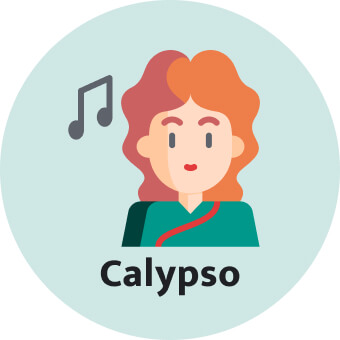
In Greek mythology, Calypso is the daughter of the Titan Atlas and is the nymph of Ogygia. For seven long years, she kept Odysseus on her island, wanting to make him her husband. She holds him as a prisoner, enchanting him with her signing. However, despite Calypso’s incredible beauty and the promises of immortality, Odysseus cannot help but long to go back home. No matter how hard the nymph tried, she was not able to win over the hero’s heart.
Athena finally convinces Zeus to command Odysseus to be released. The king of gods sends Hermes, the messenger, to bring the news to Calypso. And she is enraged. She speaks of the double standards of gods, who take mortal lovers all the time, but goddesses are not allowed to do the same. Calypso in The Odyssey is the first character to raise the question of different treatment between men and women.
Eventually, the goddess Calypso relents. She gives Odysseus provisions for the road and a raft, and with a heavy heart, lets him go back home.
Circe
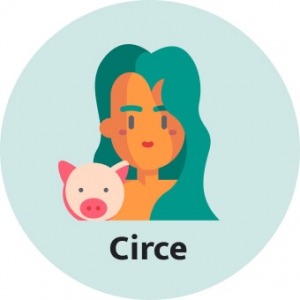
Odysseus encounters the sorceress Circe when he and his crew find themselves on the island of Aeaea. The gorgeous and immortal sea witch has a palace filled with animals, all previously human. She tricks Odysseus’ men into drinking wine, which turns them into pigs.
With the help of Hermes, Odysseus resists her magic powers. Circe is intrigued enough to invite him to stay with her. She turns his men back and offers them the luxuries of her palace. There, Odysseus temporarily forgets about his goal of returning home. He spends an entire year indulging in Circe’s hospitality until his men finally remind him of Ithaca. Circe in The Odyssey is a reminder of the dangers of indulgence.
The sorceress doesn’t try to hold them back. In fact, she offers advice and guidance. She instructs Odysseus to go to the Underworld to seek out a dead prophet and warns him of the dangers ahead. Odysseus and Circe part on good terms.
Poseidon
Poseidon in The Odyssey is one of the main antagonists. Odysseus angers him by blinding and tricking his son, the Cyclops Polyphemus. Poseidon is the god of the sea and is known for his bad temper. This is why Odysseus’ journey back to Ithaca is riddled with constant storms. It is unknown whether Odysseus and Poseidon ever reconciled.
Zeus
Known as the king of gods, he has the ultimate power on Mount Olympus. In Greek mythology, Zeus is sometimes shown with a scale, weighing people’s fates. He likes Odysseus well enough, appreciating his wisdom and heroism. Yet, Zeus sends down a storm to punish Odysseus and his men for eating the cows of the sun god Helios.Zeus in The Odyssey is mostly neutral in his judgment. Still, he is compliant when Athena begs him to help out her favorite mortal.
👹 Monsters in The Odyssey
Polyphemus
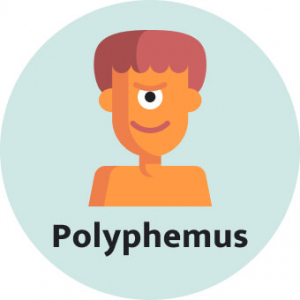
Polyphemus, in The Odyssey, is a gruesome and terrifying Cyclops that lives on an island herding sheep. He is the infamous son of Poseidon and the key reason why Odysseus struggles to get home.
Odysseus finds himself trapped in his cave when the giant blocks the entrance with a huge boulder. Despite his men’s protests, the hero decides to give the monster a chance by trying to communicate with him. Polyphemus, in turn, eats some of the crew and proceeds to take a nap. By Ancient Greek standards, his lack of hospitality makes him a truly despicable creature.
Using his cunning, Odysseus devises a trick to blind the Cyclops in his sleep by getting him drunk on wine. With his one eye gouged out, Polyphemus feels around for his sheep before letting them out of the cave. Odysseus, meanwhile, has instructed his men to tie themselves underneath the animals. The crew escapes, rushing back to their ships.
This is where the hero’s ego gets the better of him. He reveals his actual name to Polyphemus. The Cyclops curses Odysseus, asking his father Poseidon to take revenge.
The Sirens
The myth of the Sirens is a well-known one. These Homeric creatures look very different from the mermaids we are used to.
Sirens in The Odyssey have the bodies of birds and the heads of women. They live on an island near Scylla and Charybdis, playing their lovely music and singing their enchanting songs. Sirens wait for passing ships, enticing the sailors with their melodies.
Swimming past, Odysseus instructs his men to plug their ears and tie him to the mast of the ship. Under no circumstance should they untie him. The song that the Sirens sing is incredible. They promise Odysseus endless knowledge should he come to them, but his crew holds him back. Thus, he becomes the first person ever to survive the call of the Sirens.
Scylla and Charybdis
Scylla and Charybdis in The Odyssey are horrible sea monsters that live opposite each other. Between them lies a narrow waterway. Odysseus had to pass it to get to the Underworld.
Scylla is described as having four eyes and six long necks with six grisly heads, each containing three rows of sharp teeth. She also has twelve legs and a catlike tail, and six dog heads around her waist. Despite this horrible appearance, Circe advises Odysseus to sail closer to her than to the other monster. When his crew is distracted, she eats six men – one for each head.
Charybdis is a monster that lives under a small rock. Three times a day, she swallows the sea around her. This way, she creates a gigantic whirlpool that swallows ships whole. Odysseus passes by Charybdis when stranded on a raft, and it was sucked into her mouth. The hero manages to survive by clinging to a tree that was growing on her rock.
Thanks for reading the article! We hope that it was informative and helpful. To find out about the plot or themes of the epic poem, check the links below.
